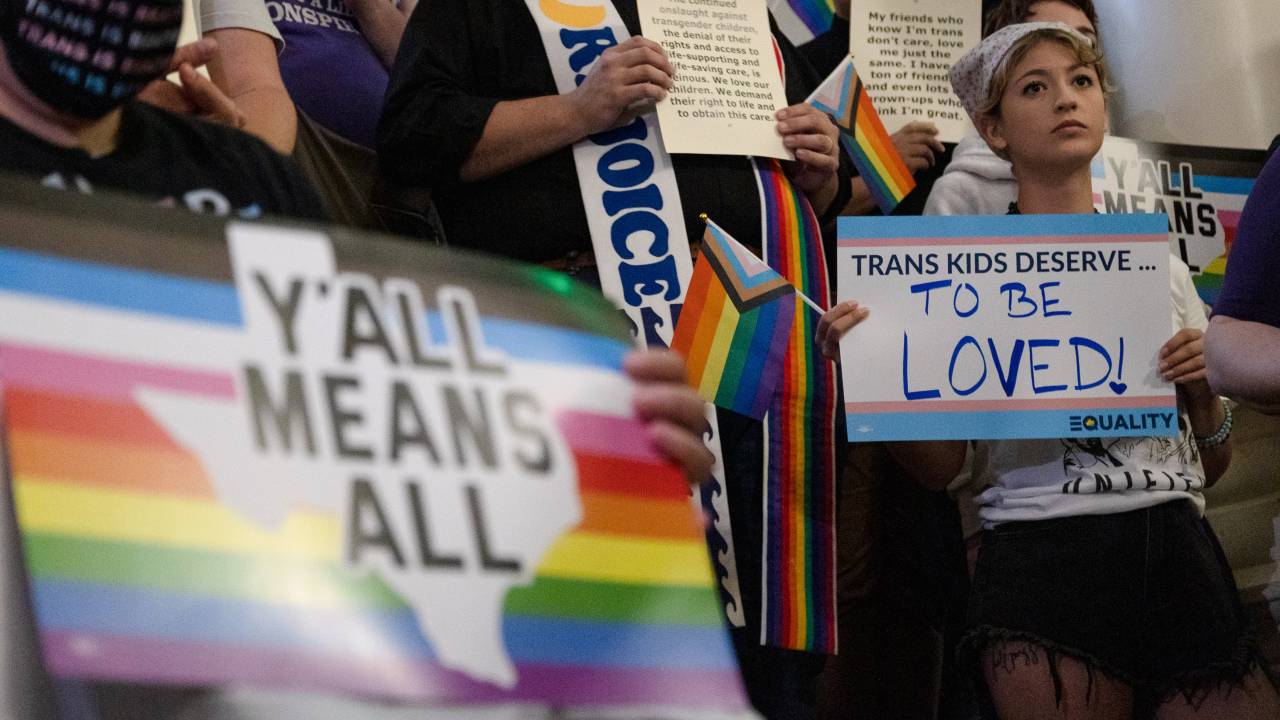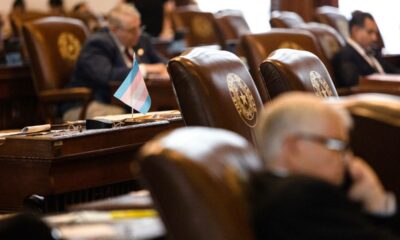88th Texas Legislature
Lawsuit seeks to block Texas from banning gender transition-related care for children
The families argue the new law, which goes into effect Sept. 1, violates their parental rights by stopping them from providing medical care for their children and discriminates against transgender teens.

This article originally appeared in The Texas Tribune
 Several families with transgender children are asking a judge to block a new Texas law that would stop minors from accessing many types of transition-related health care, including puberty blockers and hormone therapies.
Several families with transgender children are asking a judge to block a new Texas law that would stop minors from accessing many types of transition-related health care, including puberty blockers and hormone therapies.
The families argue the new law, which goes into effect Sept. 1, violates their parental rights by stopping them from providing medical care for their children and discriminates against transgender teens on the basis of sex. Several doctors have also joined the lawsuit, arguing the law interferes with their licensure and ability to practice medicine.
The lawsuit, which was filed in state court Wednesday, relies on legal arguments similar to those that have halted or blocked restrictions in several states, including Florida, Arkansas and Tennessee.
“The attack that Texas legislators and the governor have launched against transgender youth and their families and providers is stunning in its cruelty,” said Paul D. Castillo, senior counsel for Lambda Legal, which filed the lawsuit. “They are actively ignoring the science, dismissing best-practice medical care, intervening in a parent’s right to care for and love their child, and explicitly exposing trans youth in Texas to rampant discrimination. This law is not just harmful and cruel, it is life-threatening.”
All major medical associations support the use of puberty blockers and hormone therapy to treat gender dysphoria, the distress someone feels when their gender identity doesn’t match the sex they were assigned at birth. But in recent years, conservative groups have launched an all-out war on gender-affirming care, branding it “genital mutilation.”
Earlier this year, Republicans in the Texas Legislature passed Senate Bill 14, which Gov. Greg Abbott signed into law in June. The law stops transgender minors from accessing puberty blockers, hormone therapies or transition-related surgeries, which medical experts say are rarely performed on children. Children already receiving this care are required to be weaned off in a “medically appropriate” manner, the law says, which many doctors say would be unethical.
“The science on gender dysphoria lacks sufficient high-quality evidence documented, and there’s a growing list of harms, established side effects that accompany patients,” state Rep. Tom Oliverson, a Cypress Republican who sponsored the bill in the House, said during debate on the bill. Oliverson has said the bill was written to withstand expected court challenges.
After the lawsuit was filed, Republican state Rep. Jeff Leach of Plano tweeted that the challenge was expected: “What should also be expected is the State of Texas vigorously defending this law that protects children from dangerous and irreversible modification and mutilation procedures. We will fight. And we will win.”
The Texas attorney general’s office did not immediately respond to request for comment.
Although the law has yet to go into effect, health care options for transgender minors are already narrowing in Texas. In May, Houston-based Texas Children’s Hospital announced it would discontinue hormone therapy and other gender-affirming care treatments. The same month, adolescent health specialists at Dell Children’s Medical Center in Austin parted ways with the hospital after Attorney General Ken Paxton announced an investigation into the hospital.
“I can’t tell you what it feels like to be on the end of a call of a parent who has lost their child because their child looks out into the world and sees a world [where], overwhelmingly, adults are telling them and bullying them that they do not belong here, that they are not well, that they are not who they are,” said Emmett Schelling, executive director of the Transgender Education Network of Texas. “Then you strip away what’s already a thin layer of the system of health care to support our communities here in the state of Texas. And it’s an even worse outcome.”
Schilling said the law’s “chilling effect” is also diminishing health care options for transgender adults. Some families have decided to leave Texas to ensure their children can continue to receive health care.
“Because my daughter might need puberty blockers in the next few months, I am temporarily relocating out of state with her and my other child,” said one of the plaintiffs, identified in the lawsuit as Mary Moe, who is the mother of a 9-year-old transgender daughter. “I am heartbroken to have to take my children away from their home and their father, even temporarily. But I know that Texas is not a safe place for my daughter if this law forbids her access to this care.”
Texas is the largest of 18 states that have recently passed restrictions on gender-affirming care for minors. But these laws, which mostly sailed through Republican-dominated statehouses, are running into significant barriers in the courtroom.
In June, a federal judge ruled that Arkansas’ ban on gender-affirming care for minors is unconstitutional because it violates the due process and equal protection rights of transgender children and their families.
“Rather than protecting children or safeguarding medical ethics, the evidence showed that the prohibited medical care improves the mental health and well-being of patients and that, by prohibiting it, the State undermined the interests it claims to be advancing,” the judge wrote.
Federal judges in Florida, Kentucky and Tennessee have also blocked those states’ laws from going into effect, although an appeals court intervened to allow Tennessee to implement its ban.
This lawsuit is filed in state court, citing parental-right protections laid out in the Texas Constitution.
“The Texas Constitution provides stronger rights for parents, stronger rights in the guarantees of equality … and much stronger rights with respect to the individual rights of autonomy,” Lambda Legal senior counsel Paul Castillo said. “Those decisions that rest with parents are at their apex when they are made in consultation with physicians who recommend this medically necessary care.”
William Melhado contributed to this story.
The Texas Tribune is a nonpartisan, nonprofit media organization that informs Texans — and engages with them – about public policy, politics, government and statewide issues.
88th Texas Legislature
Texas’ ban on certain drag shows is unconstitutional, federal judge says
Senate Bill 12 would have prohibited performers from dancing suggestively or wearing certain prosthetics in front of children. Critics sued the state, saying it violated the First Amendment.

This article originally appeared in The Texas Tribune
 Texas cannot enforce a new law that restricts some public drag shows, a federal judge said Tuesday in declaring the legislation unconstitutional.
Texas cannot enforce a new law that restricts some public drag shows, a federal judge said Tuesday in declaring the legislation unconstitutional.
U.S. District Judge David Hittner found Senate Bill 12 “impermissibly infringes on the First Amendment and chills free speech.” The struck-down law prohibited any performers from dancing suggestively or wearing certain prosthetics in front of children.
Hittner ruled that language discriminated based on viewpoint and is unconstitutionally overbroad and vague.
“The Court sees no way to read the provisions of SB 12 without concluding that a large amount of constitutionally-protected conduct can and will be wrapped up in the enforcement of SB 12,” the ruling reads. “It is not unreasonable to read SB 12 and conclude that activities such as cheerleading, dancing, live theater, and other common public occurrences could possibly become a civil or criminal violation.”
The plaintiffs who sued the state celebrated the order, saying in statements shared by their lawyers that the decision affirmed their rights to express themselves.
“I am relieved and grateful for the court’s ruling,” drag performer Brigitte Bandit said. “My livelihood and community has seen enough hatred and harm from our elected officials. This decision is a much needed reminder that queer Texans belong and we deserve to be heard by our lawmakers.”
Republican state Sen. Bryan Hughes, who authored SB 12, defended the bill and pledged to challenge the ruling. The Texas Attorney General’s Office will appeal the ruling, a spokesperson said.
“Surely we can agree that children should be protected from sexually explicit performances. That’s what Senate Bill 12 is about,” Hughes said. “This is a common sense and completely constitutional law, and we look forward to defending it all the way to the Supreme Court if that’s what it takes.”
Critics of the bill, though, say that Republican lawmakers and officials this year have incorrectly — and unfairly — portrayed all drag performances as inherently sexual or obscene.
While SB 12 was originally billed as legislation that would prevent children from seeing drag shows, the final version did not directly reference people dressing as the opposite gender.
However, Republican leaders, including Gov. Greg Abbott, made it clear that drag shows were the bill’s target — comments and history that Hittner wrote “the court cannot ignore.”
Last month, Hittner temporarily blocked SB 12 from taking effect on Sept. 1 after a two-day hearing for a lawsuit filed against the state by a drag queen and LGBTQ+ groups.
LGBTQ+ Texans, advocates, artists and business groups who sued the state, argued that the law discriminates against the content of performances and restricts equally protected free expression that is protected under the First and 14th Amendments.
In Tuesday’s 56-page ruling, Hittner noted a survey of court decisions “reveals little divergence from the opinion that drag performances are expressive content that is afforded First Amendment protection.”
“Drag shows express a litany of emotions and purposes, from humor and pure entertainment to social commentary on gender roles,” the ruling reads. “There is no doubt that at the bare minimum these performances are meant to be a form of art that is meant to entertain, alone this would warrant some level of First Amendment protection.”
Other states have passed similar legislation restricting drag performance, which have also been struck down by federal courts.
In June, a federal judge in Tennessee, appointed by former President Donald Trump, ruled a law there was unconstitutional in its effort to suppress First Amendment-protected speech.
Bucking that trend, another Texas federal judge last week issued an opinion that supported drag show restrictions.
U.S. District Judge Matthew Kacsmaryk said that West Texas A&M University President Walter Wendler acted within his authority when he canceled a campus drag show. Kacsmaryk wrote that Free Speech jurisprudence had “not clearly established that all ‘drag shows’ are categorically ‘expressive conduct.’”
Hittner acknowledged his Panhandle counterpart’s ruling Tuesday. Hittner pointed to a letter in which Wendler explained his reasoning for banning the show, comparing drag to blackface and a slapstick sideshow.
“The president’s sentiment reinforces this Court’s opinion that while some people may find a performance offensive or morally objectionable, it does not mean the performance is not expressive or given First Amendment protection,” he wrote. “Not all people will like or condone certain performances. This is no different than a person’s opinion on certain comedy or genres of music, but that alone does not strip First Amendment protection.”
LGBTQ+ advocates welcomed Hittner’s decision Tuesday.
“Today’s ruling is a celebration for the LGBTQ community and those who support free expression in the Lone Star State,” GLAAD President and Chief Executive Officer Sarah Kate Ellis. “Texas now joins an increasing number of states whose discriminatory and baseless bans on drag performances are being recognized as unconstitutional and an attack against everyone’s freedoms.”
William Melhado contributed to this story.
The Texas Tribune is a nonpartisan, nonprofit media organization that informs Texans — and engages with them – about public policy, politics, government and statewide issues.
88th Texas Legislature
Federal judge bars Texas from enforcing book rating law
House Bill 900 requires book vendors to rate all their materials based on their depictions or references to sex before selling them to schools. Vendors say the law aims to regulate protected speech with “vague and over broad” terms.

This article originally appeared in The Texas Tribune
 A federal judge said Thursday he will stop a new Texas law aimed at keeping sexually explicit materials off of school library shelves on the eve of the law going into effect, according to state attorneys and lawyers for a group who sued over the proposal.
A federal judge said Thursday he will stop a new Texas law aimed at keeping sexually explicit materials off of school library shelves on the eve of the law going into effect, according to state attorneys and lawyers for a group who sued over the proposal.
District Judge Alan D. Albright indicated during a hearing that he will grant a temporary injunction sought by a group of book groups and sellers, including two Texas bookstores, who sued the state over House Bill 900 in July, the group’s lawyers said in a statement. Albright will issue a written order in one to two weeks; in the meantime, the state cannot enforce the law, according to the statement.
HB 900, which was approved during this year’s regular legislative session, requires school library vendors to rate all their books and materials for appropriateness before selling them to schools based on the presence of sex depictions or references. It also requires vendors to rank materials previously sold to schools and issue a recall for those that are deemed sexually explicit and are in active use by a school.
The plaintiffs argue that the law violates their constitutional rights by targeting protected speech with its broad and vague language. The lawsuit further alleges HB 900 would force plaintiffs to comply with the government’s views, even if they do not agree with them, and that the law operates as prior restraint, which is government action that prohibits speech or other expression before the speech happens. The vendors say it is impossible for them to comply with the rating system because of the sheer volume of materials they would need to review.
The law also calls for creating state school library standards that prohibit sexually explicit materials, requiring parental consent for students to check out materials classified by vendors as “sexually relevant” and giving the Texas Education Agency authority to review a vendor’s rating. If the TEA disagrees with the vendor’s rating and gives it a different one, the vendor must use the agency’s rating. Vendors who do not will be added to a list of vendors that schools cannot buy library materials from.
During the bill’s legislative hearings, librarians and legal experts shared concerns and worries that its language would ensnare books that are not inappropriate and, to the contrary, may be titles important for students whose lived experiences may not be reflected in other literature.
The proposal, from Rep. Jared Patterson, R-Frisco, arrived amid an ongoing debate about what materials are appropriate to be stocked in school and public libraries. Patterson and supporters of such regulations say libraries are infested with inappropriate books that must be vetted and removed.
However, skeptics of that panic and literary advocates counter that the books singled out by politicians often explore sexuality and race, topics that have been swept up in culture-war politics but remain important for youth who may not be comfortable talking about such matters with others.
Despite the concerns, HB 900 sailed through the legislative process before Gov. Greg Abbott signed it in June. It was set to go into effect Friday; however, the law’s language suggests the new requirements won’t have to be fulfilled immediately.
Most, if not all, of the state’s roughly 5.4 million public schoolchildren have already begun the 2023-2024 school year.
The lawsuit’s plaintiffs include two bookstores, Austin’s BookPeople and West Houston’s Blue Willow Bookshop, as well as the American Booksellers Association, the Association of American Publishers, the Authors Guild and the Comic Book Legal Defense Fund.
The Texas Attorney General’s office said Thursday it would move to reverse the injunction and appeal the judge’s decision. The office had not received the judge’s written order or decision by Thursday afternoon, a spokesperson said.
A court representative for Albright did not respond to an inquiry about his comments during Thursday’s hearing, reported by the plaintiffs’ lawyers and on social media by at least one plaintiff.
“We are grateful for the court’s swift action in deciding to enjoin this law, in the process preserving the long-established rights of local communities to set their own standards; protecting the constitutionally protected speech of authors, booksellers, publishers and readers; preventing the state government from unlawfully compelling speech on the part of private citizens; and shielding Texas businesses from the imposition of impossibly onerous conditions,” the plaintiffs said in a joint statement after the hearing. “We look forward to reading the court’s full opinion once it is issued.”
The Texas Tribune is a nonpartisan, nonprofit media organization that informs Texans — and engages with them – about public policy, politics, government and statewide issues.
88th Texas Legislature
Federal judge issues temporary restraining order, says Texas law banning drag shows is “likely” unconstitutional
U.S. District Judge David Hittner heard from LGBTQ+ groups, businesses and a drag performer in a hearing this week, who argued Senate Bill 12 violated their First Amendment rights.

This article originally appeared in The Texas Tribune
 U.S. District Judge David Hittner temporarily blocked a new state law Thursday from going into effect that would have criminalized sexually-oriented performances in front of children or effectively banned some public drag shows.
U.S. District Judge David Hittner temporarily blocked a new state law Thursday from going into effect that would have criminalized sexually-oriented performances in front of children or effectively banned some public drag shows.
LGBTQ+ groups sued the Texas attorney general’s office, hoping to stop authorities from enforcing Senate Bill 12, which was signed by Gov. Greg Abbott in June and was scheduled like most new laws to go into effect Friday.
In a two-day hearing earlier this week in Houston, a drag performer and entertainment businesses said Texas lawmakers’ effort to regulate these shows was an unconstitutional attempt to stifle their freedom of expression. Though Hittner did not issue a final order on Thursday, he found the plaintiffs’ argument compelling.
“Based on evidence and testimony presented at the hearing, the court finds there is substantial likelihood that SB 12 as drafted violated the First Amendment of the United States Constitution under one or more of the legal theories put forward by the plaintiffs,” Hittner wrote in the temporary restraining order.
Hittner said allowing the law to take effect would likely cause “irreparable harm” to the plaintiffs. He issued the restraining order to maintain the status quo of the legal landscape while preparing a final decision — the restraining order does not guarantee a permanent injunction. He said his order could come two to four weeks after the hearing.
Hittner heard testimony earlier this week from LGBTQ+ groups, businesses and a performer, which were plaintiffs in one of two lawsuits against SB 12. They argued the law trampled on their First Amendment rights to perform and organize drag shows. They described drag as a healing, expressive and political form of performance art with historical connections to LGBTQ+ people.
“If allowed to take effect, SB 12 will make our state less free, less fair, and less welcoming for every artist and performer,” said American Civil Liberties Union of Texas Attorney Brian Klosterboer in a statement following the judge’s decision. “This temporary order is a much-needed reprieve for all Texans, especially our LGBTQIA+ and transgender community, who have been relentlessly targeted by our state legislature.”
Defending the law, attorneys with the Texas attorney general’s office said SB 12 was narrowly tailored to protect children from sexually-explicit performances. The new law did not explicitly ban drag shows, lawyers for the state said, and these performances should not be considered expressive or receive First Amendment protections.
However, shortly after signing the law, Abbott shared a story on social media about SB 12’s passage and declared he had banned drag performances in public.
“The people of Texas were appalled to learn of an increasing trend of obscene, sexually explicit so-called ‘drag’ performances being marketed to families with children,” said Paige Willey, the director of communications for the attorney general’s office. “The Office of the Attorney General will pursue all legal remedies possible to aggressively defend SB 12, the state law that regulates such performances to protect children and uphold public decency.”
Under the new law, business owners would have had to face a $10,000 fine for hosting sexually explicit performances in which someone is nude or appeals to the “prurient interest in sex.” Performers caught violating the proposed restriction could be slapped with a Class A misdemeanor, which carries a maximum penalty of a year in jail and a $4,000 fine.
Texas is one of six states that have passed a bill restricting “adult” or drag performances, according to the Movement Advancement Project, a nonprofit that tracks legislation related to LGBTQ+ issues.
Legal challenges to similar legislation in Florida, Montana and Tennessee have successfully blocked these laws from going into effect. In June, a federal judge in Tennessee, appointed by former President Donald Trump, ruled the law is unconstitutional in its effort to suppress First Amendment-protected speech.
The Texas Tribune is a nonpartisan, nonprofit media organization that informs Texans — and engages with them – about public policy, politics, government and statewide issues.














